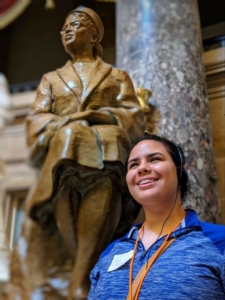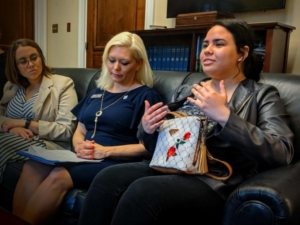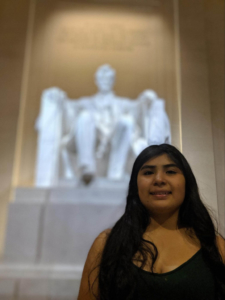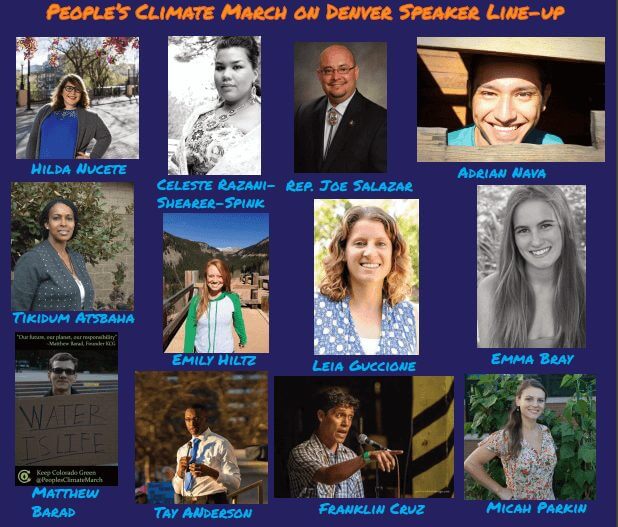The impacts of climate change, pollution, and rapid population growth put serious strains on Colorado’s water supply and our many water-dependent industries, which includes Colorado’s booming craft beer scene.
Written by: Sara Penilla Montoya, Promotora and Protégete Intern
Too often, the youngest members of our society are left without a seat at the decision-making table.
We’ve been told that we are “too young,” “not educated enough,” or “not mature enough” to understand the issues that we see everyday in our schools, our neighborhoods, and our homes. We’re discouraged from actively engaging in our communities, stifling our collective voice and the positive changes that we want to make to improve our future.
That still hasn’t stopped today’s generation from standing up together, raising our voices, and declaring how significant it is to be a part of change.
The environmental movement is the perfect example to show how children, teens, and youth — the people that will wrestle with climate impacts for generations to come — are stepping up to defend their future. The conservation movement poses an immense opportunity for young people, especially for people from frontline communities, to express the need for powerful climate leadership — and that’s why I was so excited to attend the Rising Leaders training in Washington, DC.
At the League of Conservation Voters training, students from all over the country learned more about the most pressing environmental issues affecting our communities and how storytelling can be a tool to lobby decision-makers at the state and federal levels.
Four students from the Protégete team experienced firsthand the importance and power our personal stories hold as we lobbied with members of Congress from Colorado. For some students, the trip was their first visit to our country’s capital.
We took the chance to talk to elected officials about the issues that are not only impacting our lives, but the livelihoods of millions of Americans. The stories shared a common message: it’s time for climate action, for us, our environment, and future generations.
Xioana, 16: Protecting Future Generations

Xioana stands with a statue of Rosa Parks, the only statue of a woman of color in the Capitol.
“When I was 13 years old, my family and I made the move from Caracas, Venezuela, to Denver, Colorado. My country has historically been lauded the most prosperous in South America; we had a booming economy that enticed immigration from around the world, and we welcomed everyone. That is, until political corruption changed everything.
My family saw firsthand how economic unrest had unimaginable ramifications on every aspect of peoples’ lives, including great environmental justice implications. My grandfather not only struggled for financial stability, but for access to water. He can barely afford to take just a few showers a year, due to drought exacerbated by climate change.
I remember my first day of school [in the United States]. I was walking through the hallways, fascinated by the fact that I had a locker, that breakfast was free, and that people gave away pencils. I realized that the opportunities I craved for so long were finally within my reach.
Too often, we waste our potential and decrease our value in the eyes of society; but the beauty of our ephemeral existence is that if we realize it soon enough, we can learn to appreciate the little things.
I come from a place where corruption is abundant while food, water, and electricity are insufficient. While spending thirteen years of my life in this place, I never realized how much I was being deprived, because it is easy to be satisfied with what you have when you have never known any better. In my young eyes, America’s only great value was that it snowed every now and then. I never imagined this to be the place of freedom and opportunities. The place that I come from is falling apart as I write this and losing its values as you read it. The reality is that while some people can escape this fate, others cannot. I was one of the lucky ones.

Xioana shares her story with Congresswoman Diana DeGette.
Since moving to Thornton, I have felt very fortunate that these difficulties are not an everyday reality for me and my mother. It’s why I want to join the Air Force when I graduate high school; I love this country, it’s my home and I want to keep it safe. But I need my politicians to keep me safe, too. I live right on the outskirts of Commerce City, a municipality that is known for its high concentration of industries and hardworking communities of color. These factories, including a refinery located a mere five miles from my house, cause profound health impacts on the children growing up near them.
I went to Washington D.C. to tell our members of Congress that I am the future of this country and they need to protect me.”
I am young, an immigrant, Latina, and powerful. I am the face of the United States, and I believe everyone deserves a healthy environment.
Eunice, 16: Working Together to Stop Climate Change

Eunice at the Lincoln Memorial.
“This past year, I’ve been a part of the Leadership Development class at The New America School in Thornton. My teacher, Zoraida Martinez, partnered with Protégete to teach us about environmental justice and civic engagement. We learned about how the impacts of climate change are made worse because of the waste that we create — a lot of which could be diverted by recycling or composting.
For example, when we throw plastic into the garbage, it can end up as harmful pollution in the ocean or contaminating the water and soil of our communities. Because plastic can’t biodegrade, it sits in landfills and contaminate the places where we live. That is why it is so important for everyone to do their part in protecting our planet.
I had never gotten involved in politics before; as an immigrant from Mexico, I didn’t think it was my place. But Ms. Martinez and Protégete helped me realize how powerful my classmates and I are.
And we were heard! I felt like I was putting my grain of sand in solving this huge problem, but I can’t do this alone.
That is why I went to DC to ask our federal representatives to hold polluting industries accountable. It is imperative for the government and factories to work together with regular people, like me, to stop climate change and keep Mother Earth safe.”
Eric, 22: An Exchange of Ideas

Eric in Senator Michael Bennet’s office, building a connection over attending the same school as Bennet’s daughter.
“Participating in the Rising Leaders training was a great experience. I had never been to Washington, D.C. before, and there were so many different things I was able to learn from that place, from how city infrastructure can impact our communities and our climate, to how important our stories truly are.
We frequently used public transportation (which I realized was cheaper and more efficient than our system in Denver) and discussed how communities and air quality can benefit from more public transit options.
The opportunity to learn about how important our voices are — and how we can use our stories to lobby our elected officials — was eye-opening. While I had visited the state Capitol in Colorado before, I didn’t fully understand the importance of personal stories and how they can illuminate why work needs to be done for everyone to live in an equitable world.
When we can tie these issues to ourselves — to real people, and even those who we are lobbying to — we better understand the gravity of the situation and know that we really do need to make changes.”
Our voices are what is going to shape how we solve the issues affecting us today. We shouldn’t be afraid to use our power to tell our elected officials to help us implement changes now.
Sara, 19: A Passion for the Future
“My passion for the environment is something that I have carried with me since I migrated to the United States from Colombia. It led me to a path of being what most people would call an “environmentalist:” recycling every piece of plastic and paper, turning off the lights in every room when they were not being used.
When I turned 15, I started volunteering with Protégete and learned that being an environmentalist meant so much more. I became aware of the environmental conditions in my community and those surrounding it were not what they needed to be: clean, healthy, and accessible. Such is the case for most communities of color and lower-income communities around our country. We have an obligation to these communities and others who are most impacted by environmental degradation to take care of our planet.

Sara sits outside Senator Bennet’s office.
The Rising Leaders and lobbying experience was extremely empowering. It constantly feels as if my community’s voice isn’t considered or heard when it comes to issues directly affecting us. But when I visited my elected officials to tell them why I am so passionate about these issues and what actions they can take to support my community, I was reminded how strong my community’s voice is.”
Although some of us can’t go to DC to lobby every day, we still have the power to make a change for the better. I hope that with this experience, I can motivate other young people to speak up so we can use our voices together to continue to tell our elected officials to take action to save our environment and people.
Taking part in this trip, including its trainings, and lobbying helped us realize that our voice is as strong as it could ever be, no matter how old we are or what limitations others impose on us. We can make a change in this world and we are the leaders of today. Encouraging the youth to be engaged in the issues that affect our community is essential, so just like us, they realize the importance their voice holds, and the power they have to advocate for themselves, and everyone else being silenced.
If you were inspired by our stories or if you would like to learn more about Protégete and Promotorxs programs, please click here or contact Patricia Ferrero at patricia@conservationco.org.
GRAND JUNCTION, COLORADO — Today, the Department of the Interior officially announced that it plans to relocate the Bureau of Land Management headquarters to Grand Junction.
In response, Erin Riccio, Western Slope field organizer with Conservation Colorado, released the following statement:
“It’s no surprise the Bureau of Land Management wants to relocate to Grand Junction. With a fantastic quality of life supported by our stunning public lands, the location is a no-brainer.
“We’re among the many residents in Grand Junction who are excited about this news that will benefit the local economy and bring employees closer to some of the lands they manage. However, moving the BLM headquarters to Grand Junction won’t actually protect our treasured landscapes as long as the Trump administration’s ‘energy dominance’ agenda is in place. At every opportunity, this administration and its supporters have gutted public input processes and dodged transparency requirements, even going so far as to allow drilling permits during January’s government shutdown.
“It is also worth noting that Senator Cory Gardner, who took credit for this move, continues to serve as a cheerleader for President Trump’s anti-conservation agenda. He voted time and time again to cut West Slope residents and Coloradans out of land management decisions, open treasured landscapes to drilling, and remains the only Colorado Senator to never sponsor a Colorado wilderness bill.
“We’re excited that the BLM is coming to Grand Junction. But regardless of where the BLM calls home, Coloradans want a fair public process with a more comprehensive lands management focus than the ‘energy dominance’ agenda of the Trump administration and Senator Gardner.”
###
As the 2017 legislative session kicks off today, Conservation Colorado, a 22,000-member-strong environmental organization, outlined its key priorities for the session.
Contact: Jessica Goad, 720-206-4235
In response to the news that President Donald Trump is intending to sign executive orders to build a border wall with Mexico, ban some refugees to the U.S., and punish “sanctuary cities” like Denver, Conservation Colorado Executive Director Pete Maysmith released the following statement:
As an organization that does significant organizing with Latino and immigrant communities, we see firsthand how these sorts of extreme policies would impact people across the board and hurt our neighbors, friends, and colleagues. We are appalled by these announcements, which are immoral and contrary to our American values.
These policies will also have major impacts on the environment, including the border wall’s destruction of one of the most unique habitats and important wildlife corridors in the American Southwest.
Our America is better than this, and Conservation Colorado pledges to stand with all people of Colorado as we fight for a better environment and future for our families. We call on the president to reconsider these policies that will hurt so many among us, and call on Senators Cory Gardner and Michael Bennet to stand up for Colorado families rather than ideological and hateful rhetoric that hurts and degrades our communities.
Conservation Colorado this morning announced a campaign to bring the Outdoor Retailer show to Denver after the show’s contract with Salt Lake City expires in the summer of 2018.
Senate President Kevin Grantham and House Speaker Crisanta Duran this evening announced H.B. 1242, a bill to fund transportation in Colorado. Pete Maysmith, Executive Director of Conservation Colorado, stated:
We are pleased to see Speaker Duran and President Grantham working together to develop legislation to address our long-standing transportation needs. While we’re still analyzing the details of the bill, we are encouraged by the significant amount of dedicated funding to multimodal transportation as well as provisions giving local governments the freedom and choice to spend money on these options.
As the second-fastest growing state in the nation, we must invest in modern transportation options, especially those that are designed to move people, not just cars. Coloradans across the state deserve a transportation system that reflects the future.
More information about multimodal options:
- Dozens of local officials, from both sides of the aisle and from rural and urban communities, sent a letter to leadership last week urging “significant dedicated funding for multimodal transportation options.”
- Multimodal options are critical to generating the public support needed to pass a measure should it come before voters. Recent polling from the Colorado Contractors Association found that more than 70 percent of voters say they are more likely to support a measure when told that it includes funding dedicated to multimodal options.
- Multimodal options are severely underfunded (a recent study found Colorado is ranked 29th among states in per capita funding for transit, investing just one-twentieth of the national average).
The Colorado House Education Committee is taking testimony this afternoon on HB 1306, a bill that would provide funds for Colorado schools to voluntarily test for lead in their drinking water.
Contact:
Jessica Goad, Conservation Colorado, 720-206-4235
Kaili Lambe, People’s Climate of Colorado, 719-445-8332
Despite snow and cold, thousands of Coloradans who believe that climate change is real and that our elected officials must take immediate action to address it turned out to the People’s Climate March on Denver this morning.
Led by indigenous leaders and youth activists, the march highlighted the voices of communities most directly affected by climate change. The march was a collaborative effort of environmental, social, racial, and economic justice groups.

Credit: Philip Wegener Photo and Video
Marchers returning from the mile-long circuit formed into the shape of a thermometer with a line at 2 ℃, which represents the amount of average global temperature rise that the planet can tolerate before the most dangerous and destructive effects occur.
Speakers and performers after the march included Colorado State Representative Joe Salazar, spoken word artists, a representative of the labor community, a Naval Officer and national security expert, members of the American Indian Movement of Colorado, several youth leaders, and representatives from the groups in the steering committee.

“The science of climate change is irrefutable, as are the potential consequences of inaction,” said Leia Guccione, Veteran of Operation Free. “No single threat poses a greater or more enduring danger to both the safety of our men and women in uniform and our nation as a whole. Climate change makes our battles harder, demands for humanitarian relief more urgent, and our resilience at home weaker–we must take action now.”
“Service Employees International Union Local 105 members are joining thousands of working people taking to the streets for the People’s Climate March to build unity, fight for a clean economy, and to protect the environment for future generations,” said Tikdem Atsbaha, a janitor at Denver International Airport and mother of two. “Greedy corporations are continuously putting profits over people and the environment, as a union member and working mom, I can’t stand by and let them threaten the very air we breathe and water we drink.”
“This is about our future, said Tay Anderson, the Student Body President of Manual High School.” That’s why it’s so important that young people get engaged, get active, and vote.”
Cover image: Christian O’Rourke, O’Rouke Photography
News is breaking that the tragic accident in Firestone, where two people were killed in a home explosion, was caused by natural gas leaking from a cut flow line.



